Benjamin M. Weilert's Blog: BMW the Blog, page 3
September 6, 2022
Be a Voracious Consumer of Stories
Being an author takes a lot of time and commitment. Depending on how fast an author can craft clean copy determines how much time they must dedicate to the various steps of finishing a manuscript. Perhaps an author is a fast writer, which might require them to spend more time editing. On the flip side, maybe an author agonizes over each word as they write, which might take longer to get through a draft but requires less time editing. Wherever you fall on the spectrum of writing and editing, there is one activity you should also dedicate some of your time to. What’s nice about this activity is that it can often be relaxing. I refer, of course, to consuming stories.
Read universal stories with wide appeal.While we encourage writers to pursue the stories they want to tell, if these stories only focus on wish fulfillment or other narcissistic tales, their audiences are likely to be limited to themselves. Reading other stories helps to give insights into how other writers approach topics with a broad appeal. Don’t discount the “popular” books for being shallow cash grabs. These stories speak to a wide range of people from a variety of backgrounds. Similarly, classics can provide timeless stories that are universal for their staying power. The more classics and popular stories you can read, you’ll be better able to adapt these techniques to your own writing. Your vocabulary will improve and you’ll find the innate story structures for each genre will come more naturally to you.
Many writers who are starting out worry that reading too much will subconsciously cause them to plagiarize what they’ve read. They worry about being unoriginal. As long as they’re not copying and pasting content and passing it off as their own writing, it’s not plagiarism. Even writing fan fiction can be considered original, even if the world and characters are from well-known stories. Heck, even Pride and Prejudice and Zombies uses unmodified sections of the original Jane Austen work and is considered original. In fact, most publishers will want “comp titles” or books that are close enough in their plot that a writer can compare them to the manuscript they’re pitching. This is why reading in the genre you’re writing is critical as well. Being wholly original is nearly impossible, so writers should at least read enough to know what their stories are most like so they can let readers know what to expect.
Stories are everywhere.I will admit that I rarely have time to read. Juggling a full-time job and a family, just finding time to write can be difficult, let alone reading a book for dozens of hours. Audiobooks have made consuming stories easier for me over the years, but I also found that stories are the backbone of most forms of media. We may fault ourselves or others for only consuming television, movies, or video games, but those writers with a keen eye for a good story can both enjoy these different storytelling mediums and consume stories at the same time. It is more important to experience a story that speaks strongly to you than to bicker about how that story is presented. I often find my creative tank refilled when I experience a superb story through a movie, and maybe you do too.
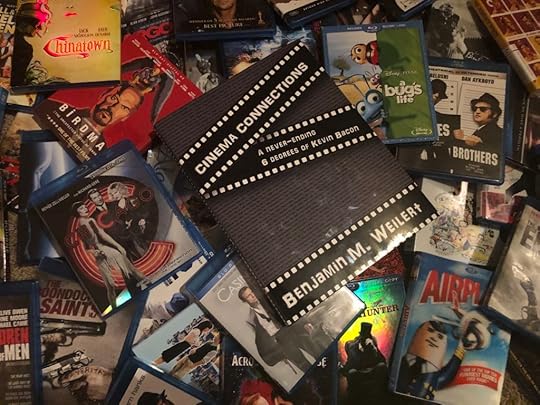 There are tons of great stories in movies…some of which are similar enough to connect together.
There are tons of great stories in movies…some of which are similar enough to connect together.I’ve already covered a handful of reasons why video games are important for writers. With many games now having intricate and well-developed stories, we are in a golden age of video game storytelling. Case in point, the video game Hades was the first game to win a Hugo Award for its writing. Television has also provided us with many enthralling stories recently. Writers should pay attention to how each episode of a TV show can act like a chapter in a book—spooling out bits of plot across multiple character arcs and providing enough of a hook at the end of an episode to have the viewer continue watching. Across multiple seasons of a television show, writers can see how a series of books could have similar story structures (with The Expanse being the best example of this). Even if you don’t have time for TV, a few hours of a movie can be useful to understand tight storytelling. It’s no wonder that many short stories end up being perfect to adapt to a movie format: there’s less that has to be cut. Hollywood has made quite a few stories by Philip K. Dick into movies, and one of Ted Chiang’s stories was made into the superb sci-fi movie, Arrival (2016).
A love/hate relationship.Not every story out there is great. Personal tastes can differ, and what might be a great story for you might be something that someone else hates. What’s important about consuming stories is being able to get a sense of why you like or hate them. Everybody is going to have different criteria they use to determine how good a story is. Even if you’re consuming stories passively—which might be an impossible feat—a part of your subconscious is going to recognize when a story is working and when it isn’t. For me, when I’m watching a good movie, I’m inspired to write my own stories. Alternatively, when I’m encountering a story I don’t like, my broken suspension of disbelief will continually find things wrong with the story until it’s done. The important thing for writers to consider when critiquing these stories is how to put the inspiring parts into their own stories while leaving out the broken parts from the stories that didn’t work for them. After all, if writers are to be creating new stories, they should at least gain a leg up from good ones and avoid pitfalls from bad ones.
What is your favorite story? Is it from a book, TV show, or movie?
How many stories do you consume in a week? A month? A year?
What do you like best in a story? What do you hate the most?
August 2, 2022
Expand Your Writing with Different Genres
Writers are inherently drawn to write the stories they like to read. There are significant benefits to knowing a genre well and building a fanbase who come to expect a certain genre from a particular writer. If you want horror, you’ll read Stephen King. If you want hard sci-fi, you’ll read Andy Weir. If you want fantasy, you’ll read Brandon Sanderson. But what if these well-known authors branched out into a new genre? Would you still read this new genre based on their reputation?
Many successful authors will branch out from their core genre. Take Stephen King, for instance. We know most of the books he writes are one-shot horror stories, but the Dark Tower series blends elements of traditional fantasy and western genres with just a dash of horror (since old habits die hard). It’s important to note that people who don’t enjoy reading horror might like to read the Dark Tower series, even if Stephen King is mainly known for horror. If you’re starting out as a writer and haven’t figured out which genre suits you best, jumping around to different genres may give you a chance to find where your audience is.
Know the tropes of the genre.Different genres will have unique structures and tropes to follow. Genres can always blend together, but if you’re writing a romance and there’s no build-up to a relationship payoff, readers who pick it up expecting a romance will be disappointed. However, it can be difficult to know the difference between tropes and clichés. Knowing the genre well will let you know if something is a crutch (like a cliché) or part of the structure of the genre (like a trope). If you aren’t comfortable in this new genre, be sure to find trusted friends or other authors to beta-read your work to ensure you aren’t making any obvious mistakes.
The more you write in a genre, the better you’ll get to know it. Don’t be discouraged if you aren’t feeling this new genre after writing one or two stories. These things take practice. Still, you will probably pick up a few different tropes that you can pull into your main genre. Some genres are also close enough that they can be easily combined. Mixing and blending genres is one of the best ways to be original in a market that can be over-saturated. Originality can help you stand out, but mixing genres might pull in twice the number of readers for your work.
Start small.There is nothing requiring a writer of a new genre to craft something original. Writing a fan-fiction of a well-known work in the genre helps reduce the burden of world-building but also can get a writer comfortable with what a story set in that genre should look like. This is where being well read across a variety of genres comes in handy. They don’t all have to be books, either, as movies, TV shows, and video games can provide jumping-off points for trying out a new genre. You don’t have to start from scratch.
It can be tempting to just jump all the way into a new genre. Writing a multi-book series is a commitment and if you botch the first book, it’s not likely readers will return for the rest of them. Even just a single novel can take a long time to write and edit so that it’s ready for readers. Short stories are a great way to test out new ideas, including new genres. Even flash fiction only takes 1,000 words to explore a genre you’re not used to. Looking out for anthology or contest submissions might give you the right inspiration to try out a new genre if it’s part of the requirements. These opportunities rarely ask for anything larger than a short story.
You might find something you like.I enjoy writing science fiction and fantasy. I’m comfortable in these genres. Still, I’ve written in a few different genres when they pique my interest. Some stories, like the horror flash fiction “The Terrible Presence” or the historical paranormal novella “Kami’s Curse,” were interesting to write because of the different feel of the genre. Other stories, like the steampunk short story “Ironed Man,” were close enough to what I had already written that I enjoyed finding new ways to incorporate the tropes I already knew. When it comes right down to it, though, with each new genre I explore, my writer’s toolbox expands with the knowledge of these genres.
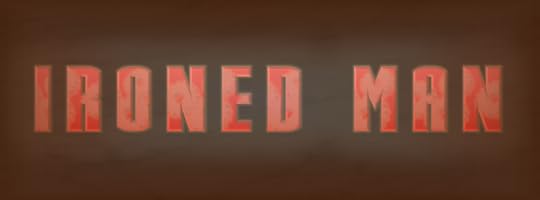 I wrote “Ironed Man” off an anthology prompt and loved the result.
I wrote “Ironed Man” off an anthology prompt and loved the result.
What are other examples of famous authors writing outside their main genre?
What two genres do you think would go well together?
If you’re reading a new genre, do you test it out by reading short stories?
July 5, 2022
You Should Write Short Stories
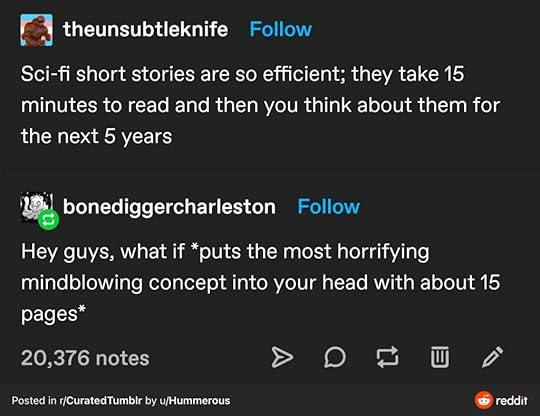
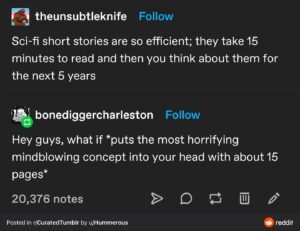 It’s strange to me how people are increasingly consuming short-form content like TikTok videos or Instagram Reels, but won’t read short stories. Some flash fiction is short enough to read in a few minutes, but the desire for novels and series of books instead of short stories is probably an effect of the decline of the magazine. This doesn’t mean authors shouldn’t write short stories. Some incredibly famous authors like Isaac Asimov, Philip K. Dick, and Kurt Vonnegut used to have their short stories published in magazines like Galaxy Science Fiction, Playboy, or Collier’s. Even modern authors like Ted Chiang have found success with their short stories despite the limited audience.
It’s strange to me how people are increasingly consuming short-form content like TikTok videos or Instagram Reels, but won’t read short stories. Some flash fiction is short enough to read in a few minutes, but the desire for novels and series of books instead of short stories is probably an effect of the decline of the magazine. This doesn’t mean authors shouldn’t write short stories. Some incredibly famous authors like Isaac Asimov, Philip K. Dick, and Kurt Vonnegut used to have their short stories published in magazines like Galaxy Science Fiction, Playboy, or Collier’s. Even modern authors like Ted Chiang have found success with their short stories despite the limited audience.
I started out my journey as an author by writing short stories just to get the ideas out of my head. These stories focused on a singular concept and explored it in a few thousand words. A lot of speculative fiction revolves around a dense exploration of “what if” scenarios that don’t highlight the characters as much as the ideas the author wants to convey.
Short stories are plot-driven.With this in mind, what are the benefits of writing short stories? If you’re starting out as a writer, short stories are a great way to test out ideas you may have without committing to a whole novel first. It’s easier to ask people for feedback on something that’s 5,000 words compared to 50,000 so you can fix any issues with it before you expand into a longer format. In fact, my first novel, , is basically a collection of six short stories set in the same universe and with the same cast of characters—just with different locations for each chapter/story. Flowers for Algernon is a perfect example of a short story that was later expanded into a larger book.
Sometimes, a short story has room to grow into something bigger. There’s usually enough tangential content to expand into a novella or novel. Both my short stories, “Soul Photographer” and “Ironed Man” had enough lore I uncovered in my research to warrant more exploration of these ideas. That I could try out the base concept of these ideas first helped confirm that they were stories I eventually want to flesh out into full-length novels. Recently, I expanded a short story into a novella, which allowed me to better explore the character and widen the idea into something deeper than just “an origami ninja.”
Break the mold with short stories.Short stories don’t even have to follow a classic narrative structure to be of some use. Take, for instance, a few of the short stories I wrote for NaNoWriMo in 2021. “Travel with Rick Steves: Corporations Through the Back Door” and “In search of the mythical Nar” were written more as world-building notes than stories with actual plots. I even used “In search of the mythical Nar” as a foundation to write “The Physics of Equus Monoceros.” I had to write the 5,000+ words of “In search of the mythical Nar” first to understand what I wanted to convey in the 3,500 words of the follow-on short story.
If you don’t know what to write or if you’re looking for a challenge (or to expand your writing repertoire), writing prompts are a great place to start. There are plenty of places online that have prompts, but the most useful prompts I’ve found have come from writing contests or anthologies (i.e., a collection of short stories based on a theme). Not every prompt speaks to me, but there has been enough that I felt compelled to write something for it. Even if my stories don’t win a contest or are accepted into an anthology, they still exist and I still gained something from writing them. Saving rejected short stories and polishing them or tweaking them for a different prompt can prove fruitful in the future. Case in point, I wrote “Kami’s Curse” because it was a fun idea, but when an anthology prompt for “unusual shifters” came along, I submitted it and it was accepted.
Want to get published? Write a short story!Despite fewer readers of anthologies and magazines, having your short stories accepted in these formats adds gravitas to your bibliography. It’s much easier to be “traditionally” published through anthologies and magazines than traditionally publishing a novel through an agent. The more stories you have published in a professional context, the more seriously people will take your writing. This may lead some readers to find you and read your other works. You can also network with the other authors who were published in the same anthology or magazine. Overall, short stories are an important part of a writer’s toolbox. They are easy prototypes for larger stories and are often the best way to win contests or gain exposure through anthologies. If you’re not writing short stories, you should start writing short stories.
What’s the most memorable short story you’ve read?
How fast can you write a short story? A week? A day?
If you had time to read a chapter of a book, would you instead read a short story?
June 7, 2022
Writing shouldn’t be solitary
When people say “writing is a solitary activity,” they do not refer to the entire process. Yes, nobody but you will sit down and put the words in your head onto the page. I know I’ve written a lot about how a self-published author can “do it all,” but it’s important to know the value of community as an author. The best-written works of all time hardly existed in a vacuum. Even if the actual process of writing can be solitary, it can become isolating if we don’t connect with others who have this same experience.
Writing should be an experience. Not everyone has the same process or hangups, but there are enough similar highs and lows that you can empathize with when you talk about your craft with fellow authors. We understand the highs of selling our work or getting a glowing review as much as we know the pain of writer’s block or critical feedback. Sometimes a close group of author friends can help you out of some imposter syndrome or encourage you to keep going with the arduous process of editing a manuscript—let alone querying it. Depending on where you are on your journey as an author, it’s likely you can find others who have been through the same thing and can sympathize.
Network to expand your reach.While I’ve discussed how conventions can be a great place to meet other authors, there are also organizations you can join that are full of authors who might like a challenge (like NaNoWriMo), are local to your city or state, or write in your genre (like the Science Fiction Writers of America). Some of these organizations might have membership requirements or dues, but don’t let that dissuade you from joining once you meet the criteria for entry. The point is that some of these larger organizations are out there and already established, so you don’t need to start an entire group from scratch.
I’ll admit it’s a little intimidating joining a group of established writers when you’re only just starting out. Perhaps you are only comfortable with self-publishing and being around writers with agents and traditionally published manuscripts makes it feel like they’re looking down on you. There is no requirement that you have to join these large organizations. If you’re just starting out, maybe try a mentor-protégé relationship with a more experienced writer who can take you under their wing to show you the ropes. From there, perhaps join up with a few authors who are at your same stage so you can bounce ideas off them and potentially develop some solid beta readers or critique partners. Maybe even split costs to get a vendor table at a convention with these authors.
There are many fringe benefits of developing your author network. Each author has their own network of beta readers, critique partners, editors, and cover artists you can potentially use if you develop those relationships. These authors might also promote the books you’ve written to their readers, thus increasing your fanbase. In this ever-increasingly competitive world, you might think that authors don’t want to see their fellow writers succeed because then it means there are fewer people buying their books. In reality, most authors I’ve run across are quite helpful and want to see others succeed—even if it triggers their imposter syndrome.
A leech is worse than a lone wolf.With all of this in mind, be sure that you pay back and pay it forward with these writing relationships. People can put up with some mooching if you’re starting out, but if you don’t balance it out with your own contributions to their beta reading, critiquing, or promotion, they’ll likely not want to keep working with you for long. Just like in any relationship, be sure to contribute to your network with your own talents. If you’re trying to “do it all,” then offer to help someone who might be struggling with some part of their process. Even a simple cross-promotion post on social media can go a long way.
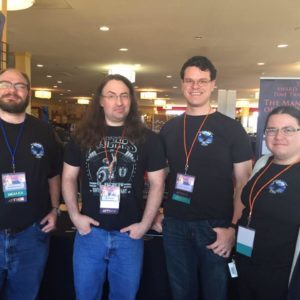 The Midnight Writers with Jim Butcher.
The Midnight Writers with Jim Butcher.In the end, you should enjoy being with a group of authors. I had a lot of fun with the Midnight Writers putting together anthologies and selling books at conventions. I learned a ton during those years and have many interesting stories from those times (like when we met Jim Butcher). While we don’t all meet much anymore, I’ve been able to use these experiences to grow into new stages as an author. You don’t always have to have the same network of authors. Sometimes, it’s OK to leave a group that isn’t working for you. These connections can come and go, but they should always be there to support you on your writing journey.
What about you? Where do you find your “author friends?”
What help do you need from a network of authors?
What skills can you provide for your author friends?
May 12, 2022
Audiobooks by the Author
Since audiobooks are all the rage for potential readers to encounter your work, I recommend getting an audiobook version into the world as soon as you can—after the paperback or eBook drops, that is. In my three-part series about creating my first audiobook, I discussed how the process isn’t too intimidating once you get into it. With minimal equipment and an abundance of time in the evenings, I recorded, produced, and distributed the audiobook for First Name Basis by myself. I did it mostly as a test so that when it came time to narrate my memoir, I could get my most personal story out to the world in my voice. It helped that I had enough experience in these three aspects of making an audiobook due to hobbies I had while in high school and college. You can still hire narrators, producers, and distributors for your audiobook, but these costs add up quickly.
During my panel on audiobooks at COSine 2022, there were a wide variety of individuals who had done audiobooks. The other panelists included an author who paid for narration, an author whose publishing company did the audiobook, and a narrator who did voice acting for audiobooks. I was the one author on the panel who not only wrote the book but narrated it, too. As I listened to the experiences of these panelists, I realized there are some distinct advantages of authors narrating their own work.
Cutting out the middlemanJust like commissioning an artist to create art for your book requires you to describe what you’re looking for, the same process applies to hiring a voice actor to narrate your book. This can be quite involved. You need to provide details on every character—what they sound like, their personality, any unique speech patterns, etc. If you’re creating an audiobook of a fantasy or sci-fi story, you’ll likely have to include a pronunciation guide so your narrator will know how to say the “unique” words to your world. There’s a lot that goes into preparing your narrator to read your book. If you choose to go the route of narrating your own audiobook, you cut out the middleman. As the author, you already know what your characters sound like. You know how to say all the unfamiliar words you created.
Another time-consuming part of audiobook creation is listening to all the audio your narrator records and determining if they did it correctly. There may be lines that have the wrong emphasis, or emotions that aren’t coming through in the recording. This all requires rework by the narrator (which is why it’s important to audition for a good one). If you, as the author, are recording the audiobook, you can get exactly what you want out of the performance because you know precisely how it must sound. You’ll still want to check your recordings for quality, of course, but it takes much less time to get that good take when you know as you’re recording it if you need to try again.
For those authors who are terrified of public speaking, this narration process might be a way to help overcome this fear. However, understand that narrating your audiobook isn’t just reading the words on the page. There’s a dramatic flair to how a book is read that adds life to the written word. In your editing process, you hopefully read your entire manuscript out loud so you can hear how it sounds (and fix any awkward phrasings). Recording your audiobook is just reading it out loud again, but with the right emphasis to make it interesting to listen to.
Many people hate how their voice sounds on recordings. This is the biggest obstacle you must overcome if you are going to narrate your audiobook. If that isn’t possible, there are other options out there that could be cheaper than hiring a voice actor. Artificial Intelligence (AI) is getting a lot better at creating natural text-to-speech converters that could narrate your book. A cursory Google search shows there are a few options out there, some of which can even use a sample of your voice to work its magic. Some distribution services might frown on this approach, so you might not get on Audible with an AI audiobook. There are still other distribution options, though, so you’re not completely out of luck.
When in doubt, hire a professionalOccasionally, I’ll write a book that I want to take more seriously than the “fun” projects I’ve written—like First Name Basis. I am more than capable of recording the audiobooks for my fun projects, but the serious ones I want to have professional narrators for. This means I have to go through all the “middleman” stuff I mentioned above, but it’s likely they have a better setup and are more experienced at this kind of thing than I am. Additionally, if I have written a book from the point of view of a female character, it makes more sense to hire a woman to narrate it than for me to read the entire book in a falsetto. If you’re just trying to get your book into the ears of audiobook listeners, there are benefits of doing it yourself, but also recognize your limitations before getting in too deep.
Have you ever listened to an audiobook narrated by the author?
Are there any famous authors who narrate their own books? (Hint: Neil Gaiman)
What are other advantages of narrating your own audiobook? Disadvantages?
April 19, 2022
The Case for Conventions [PART 2/2]
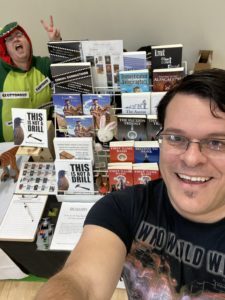 Sharing a table is a lot of fun.
Sharing a table is a lot of fun.Last month, I wrote about how selling books in person as a vendor at conventions (or “cons” for short) is a great way to get in front of your audience. However, there are many more benefits of attending conventions, whether as a vendor or just as a participant. Because—not only are you as a writer and author attending these conventions—but your fellow writers and authors are as well. If you want to network with others who have also published books, then conventions can be the best way to do this while also selling your books to potential readers.
Part of networking at conventions is discussing the craft with others who are doing the same thing you are. You can learn a lot from someone who has gone through the process to make hardcovers, audiobooks, or even books in different genres. It’s great to see others selling books at these cons, not only because you want your peers to succeed, but it also shows what kinds of books are selling. Is a particular genre hot right now? Does a book’s cover art make it an easy sell? Are the author’s blurbs and sales pitches catching customers’ attention?
Cons are a great way to expand your network.Most authors have gone through the same editing, formatting, and cover creation process that you’re likely to experience. If there’s someone in your publication process that isn’t working for you, ask around to see if these authors can introduce you to the people they use. It can be easier to trust someone who has come through for an author before than just hoping that an individual you hired from Fiver or Upwork will complete their work to your satisfaction.
Of course, many cons have more than just authors present in the vendor area. I have found several potential artists that I can commission to create future cover art at these conventions—especially the Comic Cons. Partnering with local artists is a great way to cross-promote as well, since your book covers might attract customers who would want similar art from the artist who has a vendor table of their own.
 Leading a panel on audiobooks at COSine 2022.
Leading a panel on audiobooks at COSine 2022.If you’re committed to growing as an author, many conventions have panels you can attend without the need to purchase a vendor table. These panels can have a wide variety of topics, but the conventions focused on writing and books will often have experienced authors discuss various facets of their process. These panels are fantastic resources to educate yourself on some minutiae that you might not yet understand on your writing journey.
For some examples, I have spoken on several panels over the years and even moderated a few of them as well. I have discussed topics as diverse as…
National Novel Writing Month (NaNoWriMo)Short StoriesAnthologiesAudiobooksCoversSelf-publishing on a budgetWorking with other creativesHard Science FictionMovie adaptations of booksThe great part about conventions is how casual they can be. Everyone you talk to is usually friendly and would love to talk about their craft if you ask them about it. After a while, the more conventions you attend, then the more you get to know the “convention crew” of other authors who also attend and sell books at these events. Not only can you then direct potential customers to authors who write in different genres, but they can send customers your way as well. Ultimately, cons are a fun and easy way to network and improve your knowledge about writing and being an author.
Do you know of any other networking opportunities?
What questions would you ask an author?
What topics could you discuss on a panel?
March 3, 2022
The Case for Conventions [PART 1/2]
It’s often been said that writing is a solitary profession. The problem is that—if you want to sell your books—you need to interact with other people. Selling online can be a challenge when there are so many options easily available and selling in brick-and-mortar stores has its own limitations and constraints. As an independent, self-published author, one of the best ways I’ve found to get my books into the hands of potential readers is by attending conventions as a vendor.
There are lots of different conventions (or “cons” for short) out there. For some examples, check out my Events Page to see a history of all the cons I’ve attended as a vendor. Since most of my books fit in the science fiction and fantasy genres, I have found sci-fi conventions to be great places to set up shop. That doesn’t mean there aren’t cons for other genres where you can find readers who would want to read your books. In fact, I’m fairly certain there are tons of romance book conventions for people who read that genre. This is why conventions are a great place to sell books: your audience comes to you!
Personal interaction with customers is key.I’ve found that I get a lot of good sales by paying for a vendor table at these conventions. Part of the reason for this is that I can tailor my interactions with people. By talking with potential customers, I can learn what they like to read and direct them toward the book that would most align with their interests. Of course, having a quick pitch for each of your books makes this interaction easier. If you don’t know what your books are about in a single catchy sentence, it can be more challenging to close a sale, but not impossible.
Many vendors at these conventions benefit from excellent cover art to catch the eyes of the customers who pass by their tables. Knowing the audience for your books is key to ensuring you get the right covers made to attract them and get them to stop and pick up a copy. It’s also fun to try different tactics with pitches and book displays to see what works and what doesn’t (scientifically speaking, this is known as “A-B Testing.”). This A-B Testing can be invaluable for you to better understand your customers and apply what you learned in your online presence as well. And if everything clicks, nothing feels better than discussing your book with someone who is legitimately interested in your work. The enthusiasm of readers often keeps me coming back to conventions to sell time and time again.
It’s not easy, but it’s rewarding.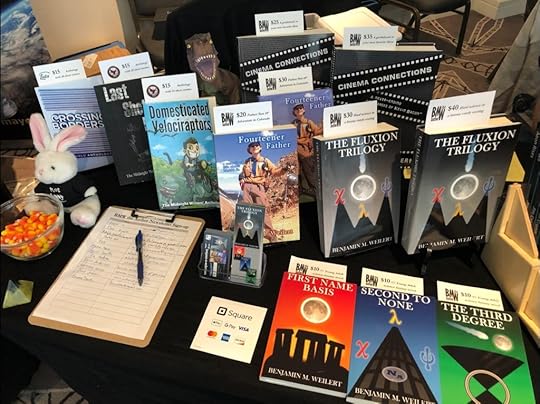 Here’s a half-table set up for my books at MileHi Con.
Here’s a half-table set up for my books at MileHi Con.As an introvert (which many authors are), selling books in person can be terrifying. It can also be demoralizing when you get a lot of rejections from people passing by who won’t even give you the time of day. All I can say is that it gets easier with time and experience. Additionally, some conventions might not work for you and it’s important to identify that before committing to coming back for the next year. Perhaps the con is too small, or it really isn’t the right audience. Often, it doesn’t hurt to get out there and try. Worst-case scenario, you’re down the cost of the table and a weekend of time.
Costs can sometimes add up quickly when selling books at a convention. Each con is different in how they price their attendance packages. I’ve been to some conventions where a vendor table is $25, which includes a ticket to attend the con for the weekend. Then there are big comic conventions (Comic Cons) where the tables are $350 and a ticket to attend for the weekend is an additional $50. The benefits of small conventions come in the event’s intimacy—there’s often less to do, which gives people enough time to peruse the vendor tables at their leisure. Bigger conventions, however, benefit from the sheer volume of customers passing by your table. If your conversion rate is 1% for every person who passes by, then you could potentially sell 100 books at a con with 10,000 attendees, as compared to 1 sale at a convention of 100.
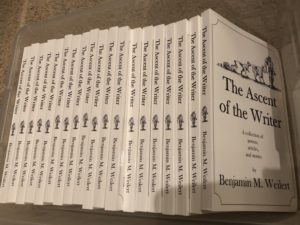 Physical copies of The Ascent of the Writer in a plastic box for transport.
Physical copies of The Ascent of the Writer in a plastic box for transport.If you’re planning on getting a vendor table at a convention, there are a few things you should bring with you. Here’s a brief listing that should be helpful…
Physical copies of your books.Cash box with change.Square/PayPal/Venmo account and credit card reader.Boxes to move/transport your books from your car (ideally big enough to store books with spines upright).Cart or collapsable hand truck to make moving boxes easier.Promotional materials (bookmarks, postcards, tchotchkes, etc.) for your books.Business cards so customers can find you online.A sign-up sheet for your newsletter (optional).Display rack or stands for your books (optional).Banner or table runner with your branding on it (optional).A lot of these things are obviously reusable from convention to convention, and you don’t need everything right from the start. Much of my equipment I picked up over the years as it became obvious I needed it. I will also note that Vistaprint sometimes has sales on business cards, banners, postcards, and other promotional material you can use to attract customers to your table. Ultimately, do what works for you. Of course, selling books at conventions is only half of the reason you, as an author, should attend them. Next month, I’ll cover the other benefit of attending cons: networking.
Have you ever attended a convention?
If you’re passing by a table with books, what’s the first thing you see?
What would compel you to buy a book at a convention?
February 1, 2022
Selling Books in Brick-and-Mortar Stores
One challenge of self-publishing books is that you need to be convenient enough for your potential customers that they’ll buy your product. When I started my author journey, I was so proud that I had a physical paperback version of my book that people could buy. But people wanted an eBook version. Then they wanted an audiobook version. I eventually made these versions available so that these customers would have no excuse not to buy my book. However, the latest accommodations customers want for self-published books is “Can I buy it at a store?”
Traditional publishing used to be the only way an author could sell their books in brick-and-mortar stores. Fortunately, it has become somewhat easier for self-published and independent authors to make their books available in places that aren’t exclusively online marketplaces. Being able to sell your books in a Barnes and Noble or independent bookstore improves your credibility as an author. It might earn you more sales because your book is in more formats than just an online eBook or Print on Demand (POD) option. This is also beside the fact that services like PayPal, Square, and Venmo have made it easy for authors to accept payments other than cash for their books.
Selling physical books locally is a passive revenue stream.People who regularly buy books from brick-and-mortar locations trust stores from brand-name franchises. Many of these bookstores have gone out of business, but the one store that remains is Barnes and Noble. Fortunately, they do have the option to sell your book in their stores, as long as you follow their rules. Most of these rules aren’t too difficult to abide by, including having a bar code and ISBN (both can be provided for free depending on the route you take on your self-publishing journey). The trickier requirements to meet for Barnes and Noble to carry your book are having a wholesaler and a marketing plan.
The wholesaler allows Barnes and Noble to return any books that don’t sell, which isn’t an option when using many POD publishing resources. Authors I’ve talked to about this route of bookselling have indicated that IngramSpark is the one resource that can meet this “wholesaler” requirement. As for marketing, you’ll likely have to spend money on online advertisements like Amazon Ads. Also, having a solid social media presence is a plus for any marketing push. Just know that you’ll have to have a convincing argument why a national chain of bookstores should carry your book.
Supporting independent bookstores is a win-win.Alternatively, some independent bookstores allow local self-published authors to sell their books on consignment. This means that the bookstore will carry your books and take a cut of the sales. As society collectively comes under the control of fewer and fewer corporations, independent bookstores are one of the few places where customers can find a truly varied selection of books to buy. Perhaps your book is in a niche genre that wouldn’t be something Barnes and Noble would traditionally carry. Independent bookstores might be your best bet to get your book out there. Of course, independent bookstores also have to turn a profit, so they may not want to carry your book if it doesn’t sell. Shelf space is always at a premium, so be sure that you’re confident in being able to sell your book on its cover and title alone.
Because many independent bookstores work on consignment, you may have to price your books accordingly so that you can also turn a profit. For example, I consign my books to a gift store that takes 40% of the sale on each book. Since I’m only bringing in 60% of each sale—after buying and shipping author copies to my house—I had to inflate my prices to cover this additional “cost” of doing business in the real world. By adding $5 to the cost of each of my books, I bridged this gap. Granted, I signed these consigned books, which is a service I offer through my online storefront as well—with a $5 fee for taxes, shipping, and handling. Either way, my customers are paying the same amount to get a signed copy of my books. However, in buying through this independent gift shop, these customers also support local small businesses with these purchases.
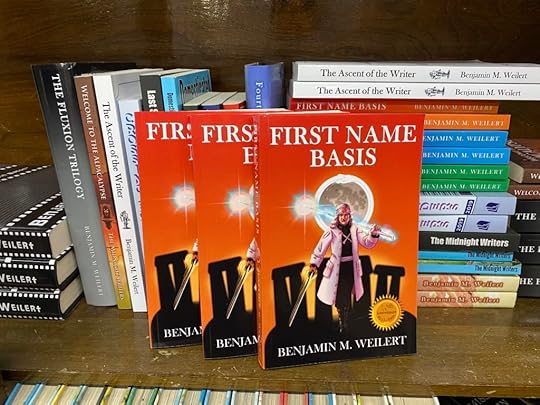 My consigned books “out in the real world” at Sanctuary Inspired Goods.
My consigned books “out in the real world” at Sanctuary Inspired Goods.Of course, being able to sell your books in brick-and-mortar stores is only possible if you are offering physical formats like paperback and hardcover (or even audiobook). While you can save a lot of money by only offering your book as digital purchases through Amazon or other online retailers, I’ve found that having an inventory of books I can sell to people directly is helpful. It expands the options your customers have to purchase your books. Plus, with the glut of options available online, sometimes having a book stand out on a physical bookshelf in a store can get you more sales with little to no money spent on advertising. Either way, my books are more likely to sell when they’re out in public places than if they’re stuffed away in a box in my basement.
Where do you usually buy books?
Have you bought books from independent bookstores?
When’s the last time you took a chance on a book that caught your eye in a bookstore?
January 4, 2022
2022: More of the Same
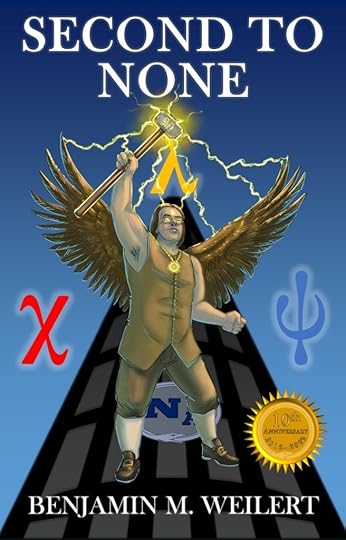
Accountability has always been key for me. I feel obligated to finish projects when other people know that I’m working on them. 2022 will be the fourth year that I have posted in January about my writing goals for the year. Many of them may appear similar to the ones in 2021, but that’s just part of long-term planning and short-term setbacks.
 Buried Colony
Buried Colony
Yes, I realize this is the third year in a row I’ve had this book on my “to complete” list. I have planned out solutions to fix these issues with the critical beta-reader and advanced reader feedback I received last year. Fortunately, I can still keep what I want to accomplish with this book intact. After I fix it up, I’ll be sending the manuscript to a sensitivity reader for a final run-through to ensure I’m not unintentionally offending anyone with my character depictions. Buried Colony will be my primary project for this year, so—if all goes as planned—it should be available in September (finally).
Second to None: 10th Anniversary Edition
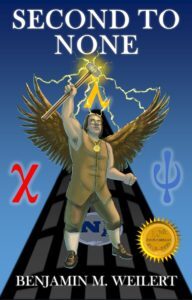 Last year’s release of the 10th Anniversary Edition of taught me a lot about re-releasing my first novel. I will be applying these lessons to this year’s 10th Anniversary Edition: Second to None. I’m still grateful for the awesome artwork (seen here) that I commissioned from artist Robin Childs. This 10th Anniversary Edition includes character sketches and the portion of the Fluxion Trilogy appendix that applies to this book. Additionally, having successfully released my first audiobook, I will also be converting this book into an audiobook. Look for the Second to None: 10th Anniversary Edition to drop at the end of June (hopefully, in all formats)!
Last year’s release of the 10th Anniversary Edition of taught me a lot about re-releasing my first novel. I will be applying these lessons to this year’s 10th Anniversary Edition: Second to None. I’m still grateful for the awesome artwork (seen here) that I commissioned from artist Robin Childs. This 10th Anniversary Edition includes character sketches and the portion of the Fluxion Trilogy appendix that applies to this book. Additionally, having successfully released my first audiobook, I will also be converting this book into an audiobook. Look for the Second to None: 10th Anniversary Edition to drop at the end of June (hopefully, in all formats)!
Stop Screaming!
This cookbook teaches you how to become proficient in the art of homemade ice cream by using the tools you likely already have in your kitchen. The first draft has been written, tested, and sent off to beta-testers. With over two-dozen recipes for my beta-testers to make, I’m expecting this project to lay mostly dormant for this year. When I get their feedback, I’ll polish up the manuscript and get it ready to self-publish in 2023.
NaNoWriMo Unknown?
I know it’s weird that I’m not sure which project I’ll be pursuing for National Novel Writing Month this year, but I honestly need to sit down and plan out the plots for a handful of different stories, so I know which one is best suited for this year’s challenge. Right now, it’s likely a toss-up between the tentatively-titled, COVID Cannonball Run—a cross-country adventure about a son and his last chance to connect with his estranged father—and One Year to Live—a drama that deals with the serious implications of planned suicide for a non-suicidal individual. Then again, I might start up a fantasy series titled, The Exiles, which subverts many fantasy character tropes. As I said, I’ll know better once I sit down and plan some of these stories out on paper.
Potential Serial?
I had a lot of fun writing short stories for last NaNoWriMo’s Autocomplete project. One of these stories explored the question, “Are Nazis anime?” of which I created the story, “Magical Prince Adolf.” The story had a bit of a serial format, with three “episodes” included in its original draft. I already have a few ideas for other episodes that I might write up this year and publish on Amazon’s Vella platform.
Blogs, et cetera…
I’ll still try and maintain a monthly blog post about my writing and self-publishing experiences, but it’s proving to be more difficult to find topics I haven’t covered already. If I happen to miss a month or two, know that it’s likely because I’m busy putting out the best books I possibly can.
December 2, 2021
2021 and Done

No, I’m not quitting. It is wild to think another year has passed as I consider everything I accomplished. There were tough months, and there was the return of conventions (which was a great boost to my self-esteem). I had to pivot on Buried Colony again but have found This is Not a Drill is selling pretty well as my first children’s picture book. On top of all this, I taught myself how to successfully get an audiobook into Audible, which was quite an undertaking. Overall, I met most of my goals from January, so let’s look back on the…
2021 YEAR IN REVIEWFirst Name Basis (10th Anniversary and Audiobook versions)
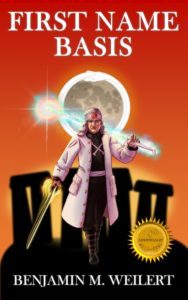 It’s amazing to think that my first novel came out 10 years ago in May. I enjoyed making the 10th Anniversary edition of , which includes character sketches by Robin Childs and the portions of the Fluxion Trilogy appendix that help explain the references in First Name Basis. In creating this version, I also recorded the Audiobook version that is now live on Audible. It was a lot of work, and I had to take a break for a few months between starting and finishing this project, but now I know it can be done and will be moving on to other books in my back catalog as I convert them to their own Audiobook versions.
It’s amazing to think that my first novel came out 10 years ago in May. I enjoyed making the 10th Anniversary edition of , which includes character sketches by Robin Childs and the portions of the Fluxion Trilogy appendix that help explain the references in First Name Basis. In creating this version, I also recorded the Audiobook version that is now live on Audible. It was a lot of work, and I had to take a break for a few months between starting and finishing this project, but now I know it can be done and will be moving on to other books in my back catalog as I convert them to their own Audiobook versions.
This is Not a Drill
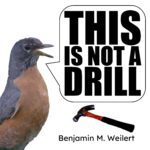 While I wanted to publish Buried Colony this September, I still have one more major edit to accomplish based on some critical feedback I received earlier this year. As a result, my first children’s picture book, This is Not a Drill, moved up in my schedule to fill its spot. This primer on tools and tool safety is already proving to be a hit at the conventions I attended and is a great gift for the kid (or adult who acts like a kid) in your life.
While I wanted to publish Buried Colony this September, I still have one more major edit to accomplish based on some critical feedback I received earlier this year. As a result, my first children’s picture book, This is Not a Drill, moved up in my schedule to fill its spot. This primer on tools and tool safety is already proving to be a hit at the conventions I attended and is a great gift for the kid (or adult who acts like a kid) in your life.
Stop Screaming! A Beginner’s Guide to Homemade Ice Cream
 In July, I finally sat down and wrote the first draft of an ice cream cookbook titled Stop Screaming! With all of these delicious recipes now captured, I have begun testing the bases and mix-ins to ensure that they can be recreated the way they are currently worded. I’ve definitely learned a lot about this process and have loved putting on my “scientist hat” as I test different techniques. Additionally, I commissioned the cover for this book from Michael Olson Art. Look for this book to be released in 2023!
In July, I finally sat down and wrote the first draft of an ice cream cookbook titled Stop Screaming! With all of these delicious recipes now captured, I have begun testing the bases and mix-ins to ensure that they can be recreated the way they are currently worded. I’ve definitely learned a lot about this process and have loved putting on my “scientist hat” as I test different techniques. Additionally, I commissioned the cover for this book from Michael Olson Art. Look for this book to be released in 2023!
Autocomplete
 Since the pandemic (and a toddler) has made it difficult to prepare some of the ideas I want to explore for future NaNoWriMo events, I decided to be a rebel this year and write 10 short stories using Google autocomplete results as prompts. I decided to frame these short stories as if an AI wrote them because it’s hilarious to see what happens when data gets corrupted and read the stories that result.
Since the pandemic (and a toddler) has made it difficult to prepare some of the ideas I want to explore for future NaNoWriMo events, I decided to be a rebel this year and write 10 short stories using Google autocomplete results as prompts. I decided to frame these short stories as if an AI wrote them because it’s hilarious to see what happens when data gets corrupted and read the stories that result.
Blog Posts
While I had a post this year that repeated a topic I already covered, there was still plenty of new things that I could write about every month:
January: 2021 Has All the FunThese were my best-laid plans. I actually accomplished most of them, despite some burnout mid-year.February: Traditional Publishing is Bizarre
There are a lot of systems in place in traditional publishing that don’t make sense to me.March: The Benefits of Fanfiction
Using created worlds as a springboard into your own original content is a great way to start.April: Why you shouldn’t ignore creative burnout
I pushed myself too hard and realized I wouldn’t create my best art until I had recovered from burnout.May: Why self-publishing isn’t “free”
To succeed in self-publishing, you’ll have to invest in a few things so readers will want to come back for more.June: The right way to ask for reviews
Since I constantly get requests for reviews, I thought it was about time that I reiterate how to do it correctly.July: Why I like Self-Publishing
I’m a control freak, but I also enjoy self-publishing’s freedom as a creative writer.August: Commissioning Art for Your Book
It can be tricky to navigate sometimes, but getting art commissioned for your book helps make it “pop!”September: How an iPhone, a comforter, and a Christmas tree helped me record my first audiobook
With this simple setup, I created noise-free audio files that Audible eventually accepted.October: What it takes to produce an audiobook
Recording the audio for my audiobook was just the first step. Next, I needed to make sure it met Audible’s standards.November: Audible isn’t the only way to distribute an audiobook
Sure, most people ask if your book is on Audible. However, there are other ways to sell it than through this Amazon subsidiary.
2021 was a rough year, but I managed to get to the end of it with the help of my friends, family, and therapist. I have a pretty good plan for what I want to do next year, so hopefully, I won’t have to pivot anymore (Buried Colony will come out, I promise).
BMW the Blog
- Benjamin M. Weilert's profile
- 27 followers



